7 Reasons Why Everyone Loves Lore Olympus

From among the myths of ancient times, Greek Mythology is the most famous and well-known pagan pantheon from being depicted in films. Although, the stories the film industry tells are either about legends or events of the war. Because of this, they don’t show the true personalities of the Greek gods.
One of the most famous stories is “Hercules” by Disney, which has shaped some people’s views on certain gods that are false from the narrative of many myths.
But a famous webtoon called “Lore Olympus” has gained popularity doing the opposite.
Instead of smudging the truth, the author of “Lore Olympus,” Rachel Smythe, writes a modern retelling of the Hades and Persephone myth where (most of) the gods involved have the personalities from their original myths while humanizing them, making the story perfect for mythology junkies.
However, the story is not merely beloved for being retelling. A majority of the time, it’s because Smythe illuminates the nuances of specific issues.
But enough of being mysterious, here are seven reasons why everyone loves “Lore Olympus.”
1. “Lore Olympus” Explores Sexual Trauma And Domestic Abuse.
In the early chapters of the story, Persephone is raped by Apollo. When she meets him, it is known through her behavior that she is uncomfortable around him, yet he sneaks into her room and has his way. However, the complexity of the event is surrounded by her response. Persephone made it clear she didn’t want to have sex with him, but Apollo convinces her she does since she was “flirting” with him all day. When he says this, she questions her actions and wonders if she did or didn’t.
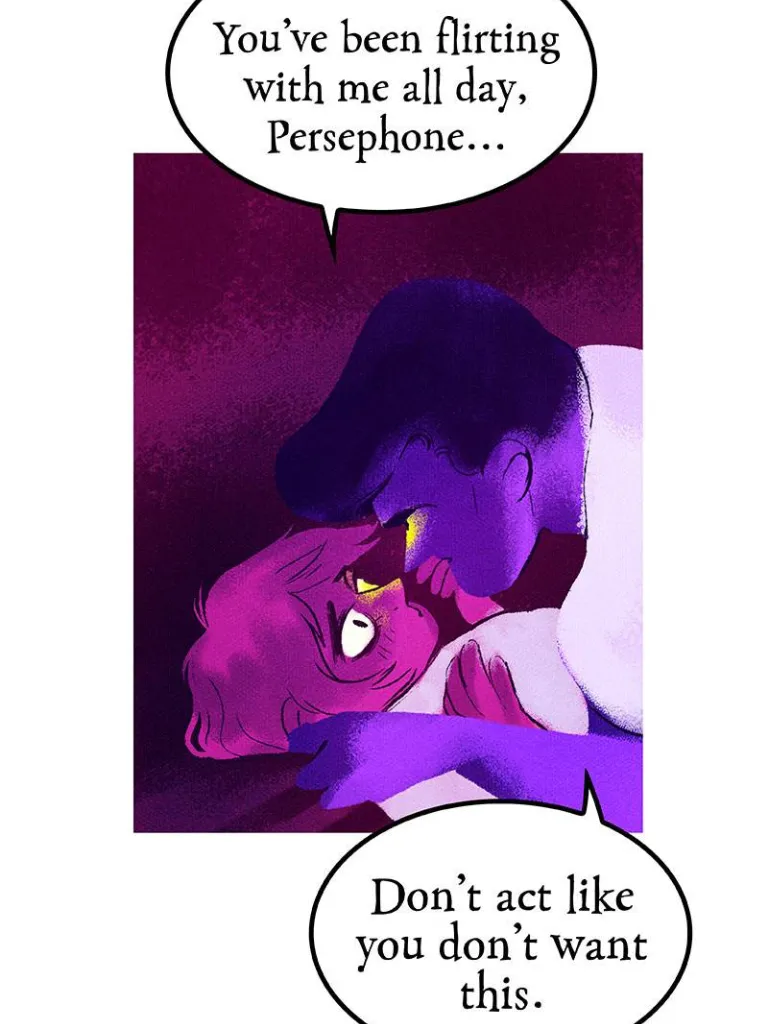
For a moment, Persephone says okay since she realized she doesn’t want to be a maiden for eternity, but she takes it back, not wanting to lose her virginity to him. Though she remains frozen. The situation then gets worse when Apollo pulls out his phone and starts taking photos. Because of this, Persephone feels guilty and ashamed for not responding, which causes her to blame herself.
Persephone’s guilt is a common experience of rape survivors since the concept of consent and rape is debatable, making her rape experience and the alike tricky to receive help. But when she tells Eros what happened, he validates her by saying Apollo raped her.
Afterward, when Persephone processes the event, she starts feeling anger and hate towards Apollo. Though most of the time, she feels uncomfortable when someone grabs her or takes a picture. And after several times, she gets furious, showing how triggers actually work.
Yet, she still feels a bit of guilt until a therapist tells her that her reaction was completely normal, which doesn’t happen until the middle of season two. So the therapist’s explanation of her response also validates Persephone’s experience, making survivors among the audience feel validated and heard.
However, the normalcy of seeing a therapist was set with Hades since he suffers from PSTD from his dad Kronos eating him alive. Because of this, Hades regularly has night terrors about his dad. The first time we see him having a night terror is in episode 25, but when he wakes, he says he’ll make an appointment with his therapist.
And in another scene, He’s seen writing a fake letter to Persephone in episode 47 as a way to “unpack my emotions and gain a greater understanding of myself,” which he says his therapist advised him to do.
But sadly, in the letter, Hades writes that he’s going to give Minthe a second chance since it was unfair to her and her desire to change, despite the emotional and mental abuse she pervious done to him through her verbal attacks.
She would mostly do this to him whenever she was upset with him after not getting what she wanted. She’ll also use the silent treatment expecting an apology with food and gifts, which he has done in the past. Luckily, he drew the line and completely broke off his relationship with her once she attacked him with his deepest insecurity.
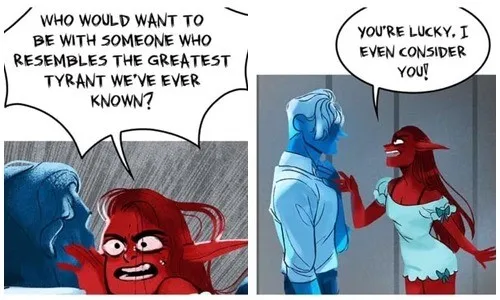
Terrible to hear, Minthe’s toxic behavior reveals how men can be mentally and emotionally abuse by women.
2. The Harmfulness Of Toxic Masculinity Is In “Lore Olympus.”
Toxic Masculinity is defined as negative behavior that men adopt from our society’s gender norms. Men are told to be tough and be assertive, which means being aggressive. This behavior and much more are from the traditional view of masculinity, and they’re presented in “Lore Olympus” through Zeus and Apollo.
Zeus is a character who uses his power to his advantage by using it aggressively if others don’t listen to him. He’s also narcissistic about his abilities, personality, and power. To add on, Zeus is inconsiderate about Hera’s feelings that when she expresses anger at him, he refuses to listen to her by gaslighting her.
Once, he was so full of rage that he yelled at her, “You’re crazy!” Other times he leaves her alone and goes out to cheat on her, which he has always done in the lore of Greek Mythology. It’s also the reason why there are so many gods and demigods in the pantheon.
Apollo is one of the many sons of Zeus, but he looks like and acts like him the most, meaning Apollo is equally aggressive like his father but a bit more egotistical than him. Because of this, he doesn’t know how to handle being told no to anything he wants.
In one of the scenes, when Persephone rejects Apollo, he goes to Leto, Hera, and Zeus to get her hand in marriage, not caring if Persephone hates him since Hera and Zeus don’t like each other.

So Zeus’s relationship with Hera showed Apollo that women are sexual objects, which Zeus doesn’t help with his cheating. And like father like son, Apollo took this behavior by going through women like candy, which is a trait of toxic masculinity. The difference between them is that consent doesn’t matter to Apollo; instead, he takes what he wants.
Toxic masculinity is then the factor that causes Zeus to harm people, especially the person he loves. But Apollo’s toxic masculinity created his entitlement, aggression, anger, and rapist tendencies that caused emotional and mental damage to Persephone.
However, we also have positive masculinity traits presented with Hades. Traditional masculinity is often perceived negatively, but there is a positive side, which contains the traits of the classic gentleman. That is being calm, polite, kind, and respectful. Hades has all these traits, which allows him to have a best friend and a significant other who truly loves them, showing that his masculine traits are the best ones that create relationships.
3. Modern Feminism Turns Against Itself in “Lore Olympus.”
When feminism is talked about, it can have misinterpretations depending on someone’s perspective. Feminism is gender quality, but people can have extreme views on what that means. With women, that means being independent and not needing a man, making the traditional housewife life undesirable to them.
Instead, they envision themselves in a position of power and success. And because this is a widespread view, women today are expected to have the same vision for themselves and live this lifestyle, making it our new social conformity.
This is the pressure Persephone has with the expectation of being a maiden in The Goddesses of Eternal Maidenhood (TGOEM) when she wants to have romantic and sexual freedom. Sadly, before she met Hades, she believed she wanted to be a maiden when her mother groomed her.
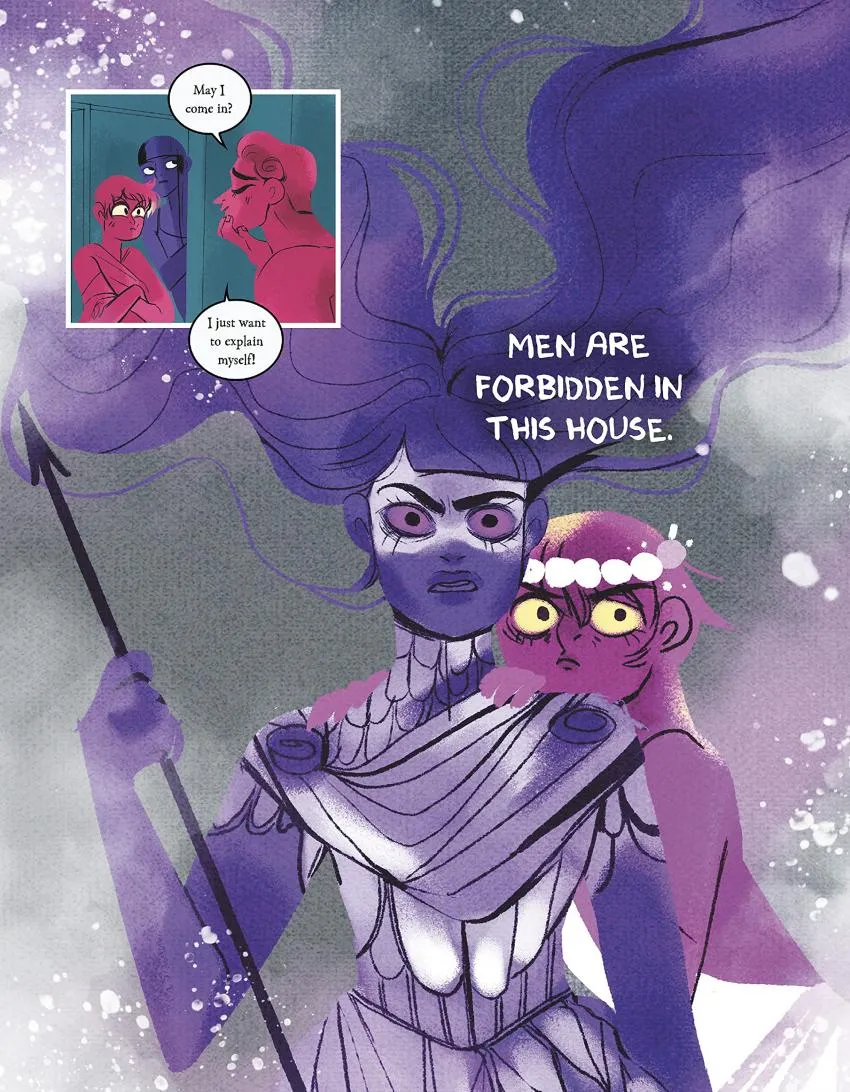
Her feelings for Hades then cause her to be hesitant with her actions since the TGOEM gave her a scholarship to attend a university, making her feel like a traitor if she decides to leave the organization to be with Hades. Hades is also aware of her scholarship and feels terrible if he ruins her higher education opportunity.
This situation shows a tug-a-war between the traditional and modern lifestyle since Persephone can’t have both. It also reveals the same tug-a-war that college women face today since it’s difficult to attend school and work while being in a relationship with children.
But because there are women who have a partner, children, and an education, they show that women can have both lifestyles. In “Lore Olympus” Hera represents this possibility since she’s a stay-at-home mom and housewife, but she’s also strong and brave with her own voice.
She may not have an education, but she’s not stereotypically submissive to her husband, which is sadly a typical depiction of a woman living a traditional lifestyle. In other words, Hera is a woman who lives a traditional lifestyle but has a modern mind with her spunky personality, showing that it’s possible to have a traditional and modern life.
Though because of this, there are some stereotypes among the women in TGOEM. Artemis is one of their members depicted with masculine energy with her behavior and interests, making her a tomboy and thus gender non-conforming.
But she is stereotyped by defaulting into maidenhood since masculine women are seen as the icon of feminism. At the same time, it can be viewed as degrading to default masculine women as maidens or portraying them with no romantic interest.
However, despite this, Artemis feels a sense of betrayal after finding out the two leading members of TGOEM, Athena and Hestia, are in a relationship, revealing that Artemis may not have wanted to be a part of TGOEM since she says, “I’m very irritated right now! Persephone is off playing house with Hades, and you two have been a thing behind my back for Gaia knows how long.”

Yet, Athena and Hestia’s relationship are stereotyped. Athena is presented as a masculine woman, and Hestia is presented as a feminine woman, allowing people to assume that they take husband and wife gender roles.
To add on, lesbian women are seen as more feminist. However, being a maiden doesn’t make someone inherently feminist, nor does being lesbian make someone a maiden, which Artemis addresses with her reaction.
Once Artemis realized Athena and Hestia were a couple, she says, “Am I the only one who’s been following this whole maidenhood commitment thing!?”
This quote reveals that their relationship doesn’t default them as maidens. So even though there’s some stereotyping, Artemis’s reaction reveals the nuances of virginity and how it’s not just broken between female and male genitals, thus recognizing other acts equally sexual.
4. “Lore Olympus” Has Emotional Cheating And Toxic Friendships.
The audience mainly dislikes Minthe, but Hades does emotional cheats on her, which is sometimes overlooked nor cared about because of her toxicity. However, it’s still an important conversation.
Before Persephone, Hades would have casual sex with Minthe. It was never serious. Minthe even states that they both agreed that they weren’t dating material. Because of this, Minthe tried not freaking out if Hades was having sex with Persephone since they weren’t exclusive.
But this jealousy allowed Minthe to realize that she does have feelings for Hades and that she should quickly change to keep him. When she expresses this, Hades gives her a chance in a real relationship.
However, because Hades fell in love with Persephone, he was giving Minthe a pity chance. So throughout their actual relationship, he was in love with Persephone instead. This is emotional cheating, which can be worse than physically cheating or rejection.
In fact, this was stated by Poseidon, who says in episode 84, “Are you sure you’re not having an emotional affair? That can be equally, if not more damaging than an affair based on physical intimacy.” And since Poseidon appears for comedic purposes, his statement is something not to take lightly. This then may be why Hera never leaves Zeus, since he hasn’t emotionally cheated on her.
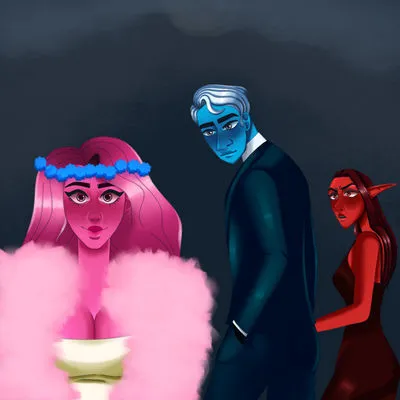
Minthe may not be likable, but no one deserves to be cheated on. Persephone even states the same, but they continue to flirt with each other, showing the lack of effort on their ends to respect Minthe even though she’s trying to better herself. This indicates that the beginning stages of recovery are socially difficult when your past is all your known for.
“Lore Olympus” then portrays the mental struggle for last when Minthe drinks with Thetis, which exposes Thetis’s toxic influence on Minthe by encouraging her to mistreat Hades again. Minthe says, “B-but you told me my “Treat ‘em mean, keep’em keen” approach was stupid.” Thetis responds, saying, “Honey, no, it totally works for you. Trust me, he needs to be punished.” To add on, she knew by making Minthe nervous over Persephone, she would drink more and never show up for her date with Hades.
In other words, Thetis intentionally sabotages Minthe’s relationship with Hades, which is seen when Minthe goes back to yelling at Hades by trying to blame him for her actions. This is the same event where Minthe attacks his insecurities. But it’s also where we see her internal thoughts of losing control that once the last words escape her lips, she instantly regrets what she said.
It’s evident that their relationship is over at that moment, and even though Minthe recognizes this, she still makes an effort to better herself by cutting of Thetis. Yet Thetis grabs her tighter by promising her a plan to split Hades and Persephone apart, making Minthe return to her toxic behavior.
With that said, Minthe is an example of someone who struggles for social and mental improvement when they have a manipulating influencer in their lives encouraging their toxic behavior.
5. There’s Classism Among The Olympians in “Lore Olympus.”
This may sound like a bad thing to like the comic, but classism is a real-life issue that makes the world and the characters more real. Plus, it reveals that even our beloved characters aren’t picture perfect. How some people overlook the issue also shows how normal classism is to us.
As you know, before Hades met Persephone, he was seeing Minthe. Minthe is a river nymph from the Underworld. But because nymphs are the servants of the Olympians, they’re lower class and looked down upon. So when others are addressing Minthe, they call her nymph trash.
In the beginning, it appears as if the title refers to Minthe since she has a bad attitude towards others. But when Persephone goes to Eros about Hades being with Minthe, Aphrodite interferes and tells her, “Nymphs do not take Gods from us. Letting that Nymph take something that you want is an embarrassment to our kind!” This quote demonstrates that the Gods are classists against anyone below them.
Though the feeling is mutual towards the Olympian gods. Thanatos is the God of Death, but he isn’t an Olympian, so he works for Hades. In fact, Hermes has to help Thanatos with his work and is said to collect more souls than him, making him underappreciated, which he feels when Persephone receives special treatment as Hades’ intern despite her lack of qualifications.
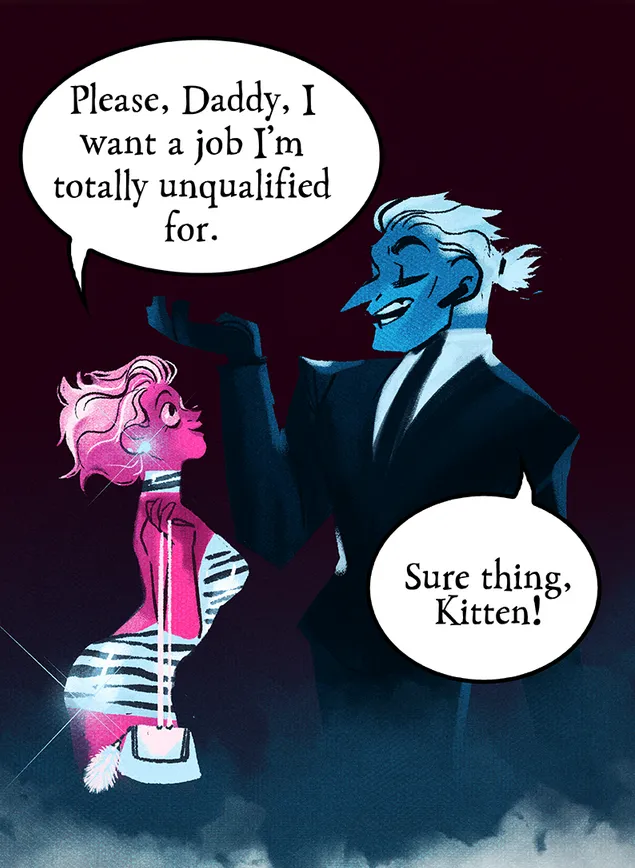
Even some citizens feel this way when the Olympians want something. When Hades sees an old lady with Persephone’s hairpiece, he tries to obtain it back from her, though his title didn’t easily sway the lady. The same happens when Persephone tries to cut a line to talk to Hades. She’s not an Olympian, but she is still a major god that the citizens refuse to get special treatment.
Helios also holds prejudice against the Olympian Gods since he’s a Titan chained up for eternity, that when Thanatos starts searching for dirty information, Helios is more than happy to tell him.
These small instances then reveal that there’s prejudice between the citizens and Olympians. However, in Minthe’s backstory, she’s seen living in a horrible apartment, not making enough money from having an unstable job.
Her apartment complex is packed with other mythic creatures, showing that the lower classes live disadvantaged lives compared to the Olympians who have everything, causing prejudice among the citizens. But they have the right to be since the Olympians abuse their power.
Zeus is someone who people hate for his behavior, but Hades actively abuses his power. When he tries to open a bank account for Persephone, he is unhappy with the wait time it takes to open an account. Hades glares at the lady in a threatening manner, so she says, “Please don’t fire me.”
But she comes up with a solution to make him happy and keeps her job. And in another scene, when Hades asks for customer information at a pawn shop, he threatens to bulldoze the place if he doesn’t receive it despite the clear private policies the register states.
He does more than this, but these are instances where he abuses his power, showing that Hades isn’t precisely innocent or a completely great person he’s glamorized to be.
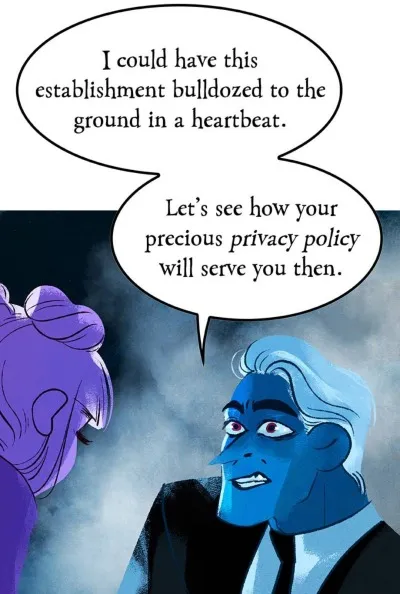
Yet, these subtle things define his character and what kind of king he is since citizens fear or disrespect him. He is even aware of this behavior that when he acts out at the pawnshop, his face softens with an apologetic look. Persephone even says because she’s not a king or a queen, she can’t just take her wrath on people, which addresses how Hades and the other gods normally behave.
With that said, the citizens of Olympus and the Underworld are prejudice towards the Olympian Gods because of their wrathful behavior from their entitlement attitude. In contrast, the Olympians are simply classists towards others because they are a lower class, which reflects the same reasons for classism in real life.
6. “Lore Olympus” Portrays A Healthy Relationship Between Hades and Persephone.
Like how most relationships start, Hades and Persephone are drawn to each other through aesthetic attraction, but as they interact, it’s tellings that they’re also sexually attracted to each other too.
This attraction is what leads to them flirting through teasing every time they interact. However, they’re comfortable with each other to talk about their personal stories, issues, emotions, showing that their interest goes beyond the physical.
When Persephone got a phone from Artemis, a crying Persephone immediately called Hades after a horrible night. Hades comforted her by making her laugh a bit before confronting her as a sad person. He explains how when he saw her, she looked sad, and when he carried her, she felt sad.
Persephone hides her sadness well, but it’s evident in her microexpressions and body language. Because she is subtle about it, him noticing her sadness shows he understands her, which he expresses with his tone, making it a bonding moment.
She doesn’t tell him why she is crying, but she does express different feelings that are true, which were about her feeling useless as a spring goddess since her mother can cover her season.
Uselessness is a common feeling, but it’s an issue that perfectly aligns with the Hades and Persephone myth that makes her human since it was her mother’s grief that caused a famine, and it was her happiness that bought back vegetation. In other words, the myth shows how Demeter can bring spring, making it reasonable for Persephone to question her existence.
In response, Hades said that she’s important since she’s the reason why mortals don’t completely fear the gods. He then added that her spring was savage and unpredictable, making it more beautiful than Demeter’s since she’s tidy and organized.
This makes her feel important and valued, yet he made her feel that way when they first met through his attention and care for her. After, the conversation went to Hades and why he wasn’t married. This same attention she gives him makes him feel loved since she’s taking an interest in him, making him comfortable to say why. From there, they continue to talk the rest of the night, and they fall asleep together over the phone.
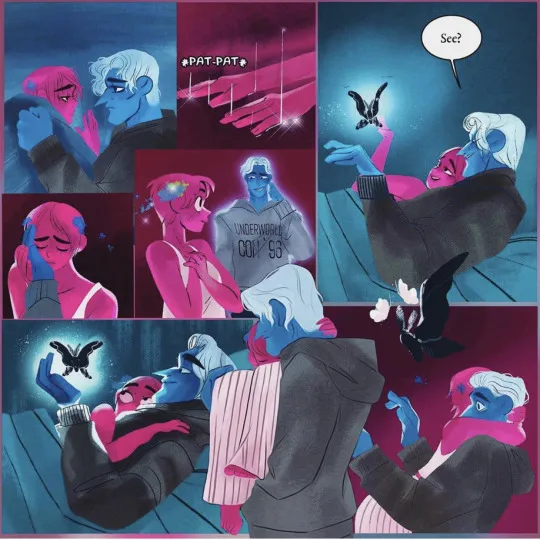
Aside from this, they’re good communicators with each other. They sometimes have unsaid things, but they eventually tell each other what needs to be said. When the issue of a paparazzi spreads rumors about Persephone, Hades tells her about it. Persephone was okay with it, but Hades took it into his own hands to solve the issue in an unethical manner. When this reaches Persephone’s ears, she confronts Hades, and he doesn’t deny the truth.
In the same episode, Persephone confesses her feelings. Hades does the same, but they end up agreeing that things are going too fast and create some boundaries for each other. Yet, at the same time, they have always been honest people. In the beginning, when Persephone is in Hades’ house, he tells her how she got there despite the embarrassing reason.
To add on, Hades tells everything to Hecate, who always looks after him and his best interests. He even politely cuts Hera and Minthe off his love life by telling them what he wants and his feelings. Persephone does the same with Apollo and talks about her personal issues with Eros, making them best friends.
In other words, Hades and Persephone are good communicators, and they don’t hold that out with each other. Because of this, Hades makes Persephone feel valued and important, and Persephone makes Hades feel loved and safe, especially since she has a friendly and nurturing personality.
7. The Art of “Lore Olympus” is Amazing.
I’m no art critic, but watercolors are used to define characters and scenes. Smythe mainly plays with different shades of colors to match the setting with the characters and create the scene’s mood. The Underworld has dark hues of blue, purple, and black that match Hades’ depressing emotions.
Persephone is a vibrant pink, which matches her personality of being friendly and optimistic. It also fits with her role of bringing life as a spring goddess. But her hue does darken whenever she’s sad or angry. Whenever she’s like this, she matches the scene of the Underworld, making her emotionally like Hades. Though a majority of the time, her presence creates a contrasted that makes her stand out.
Aside from this, some characters have the same colors, such as Apollo and Artemis, with Zeus being purple. But this is to tie them together since Zeus is their father, and they share similar traits. Artemis may be different from Apollo, but she is a hothead and oblivious like both of them.
Aphrodite is purple too, which fits her since she is easily angered, narcissistic, and delusional. There’s also yellow between Leto and Hera. They hate each other, but they’re both tactful, rude, and elegant. The colors then define the characters’ personalities, emotions, and the mood of the scene.
With that said, “Lore Olympus” is prominently praised for the visibility of sexual trauma, PTSD, domestic abuse among men, and the normalcy of seeking and receiving therapy.
But the relationship between Hades and Persephone is equally praised since they have a healthy relationship through their communication skills. In fact, their healthiness is canon through their myths, which makes them beloved by the audience, but it also guides people through examples of how to navigate their relationships.
And since I personally don’t see too many good examples, I appreciate their story and relationship.
Opinions and Perspectives
Each characters color scheme really adds to their personality and development.
The relationship development between Hades and Persephone is perfectly paced.
The attention to mythological accuracy while modernizing the story is impressive.
Really like how they handle the power imbalance between Hades and Persephone carefully.
Persephone discovering her own identity beyond others expectations is so relatable.
The story doesnt shy away from showing consequences of actions. Makes it feel more real.
Love that they show both partners working on themselves while building a relationship.
The class differences between gods and nymphs mirror real world issues perfectly.
Anyone else appreciate how they show different ways of processing trauma? Not everyone reacts the same way.
The friendship dynamics are just as important as the romance. Really well balanced.
Comparing Zeus and Hades really highlights different types of masculinity well.
What I love most is how they show personal growth isnt linear. Characters make progress and mistakes.
The art style perfectly captures the mood of each scene. Those color choices are intentional.
This version of Hades is such a complex character. Love seeing his vulnerable side.
The way they handle consent and boundaries in relationships is really educational without being preachy.
Im impressed by how they balance serious topics with lighter moments. The pacing works well.
The power dynamics between immortals are fascinating. Really adds depth to the world building.
Their communication skills are relationship goals honestly. So rare to see in fiction.
Agree about Minthe's story being compelling. Shows how hard it is to break toxic patterns.
Love how they show both traditional and modern femininity through different characters without judgment.
The way Persephone processes her trauma over time is so realistic. Its not just one and done.
Its refreshing to see a story that shows therapy as normal and helpful rather than stigmatizing it.
The portrayal of PTSD through Hades nightmares feels very authentic. Its not just used for drama.
Interesting point about class issues. I never noticed how much the nymphs are discriminated against.
The contrast between healthy and toxic relationships in this story is really well done. Great learning tool for readers.
Does anyone else love how they handle Persephone's character growth? She isnt just a victim, she has agency and strength.
I wasnt sure about the modern retelling at first but it works so well. The themes are timeless.
Artemis reaction to finding out about Athena and Hestia was so genuine. Really challenged some stereotypes there.
The emotional affair aspect is interesting. I hadnt thought about it that way before but its definitely a form of cheating.
Really appreciate how the comic shows that even beloved characters like Hades arent perfect. His abuse of power feels authentic to the myths.
The therapy scenes are my favorite part. Its so important to show characters actively working on their mental health.
Im surprised no one is talking about Minthe's character arc. Yes shes toxic but her struggle to change while dealing with bad influences feels very real.
Never thought Id see Greek mythology tackle modern feminist themes so effectively! The TGOEM storyline really makes you think.
I understand your point about Apollo but I think thats exactly how these situations often play out in real life sadly.
The way they address toxic masculinity through Zeus and Apollo's characters is really well done. Shows both the cause and effect.
Anyone else frustrated by how they handled the Apollo storyline? I feel like it could have been dealt with better.
The relationship between Hades and Persephone is so well written. I love that they take time to develop trust and communicate openly.
Actually I think the colored art style is brilliant. Each character's color perfectly matches their personality and emotional state. Its very intentional.
I find it fascinating how they modernized the myth while keeping true to the original personalities. Very different from what Disney did with Hercules!
Has anyone else noticed how accurately they portray the power dynamics between gods and nymphs? The classism feels very true to the original myths.
What really stands out to me is how they handle Hades character development. Its refreshing to see a male character openly going to therapy and working on himself.
The art style is stunning but I disagree about the color choices. Sometimes its hard to follow when everything is in similar shades of purple and blue.
I absolutely love how Lore Olympus tackles serious issues like trauma and abuse while still maintaining the mythological essence. The way Persephone's experience is portrayed feels so real and relatable.
